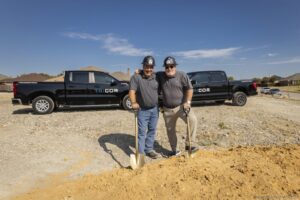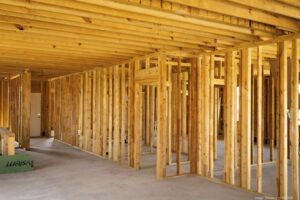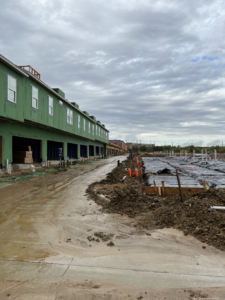With $85 billion in dry powder earmarked for build-to-rent and close to 100 developers looking for such sites to develop in Dallas-Fort Worth, Tricor is looking to capitalize on the popular and growing asset class.
The BTR market, in general, is driven by many factors, such as the increasing demand for rental properties, the number of Millennials and Gen-Zers entering the housing market who aren’t ready for a down payment on a house yet; and the change in preference of renters as they seek more privacy, space, and a sense of community, that traditional multi-family properties don’t include.
In 2014, Tricor founders noted these changes in the marketplace. They started the construction services firm with a plan to renovate single-family rentals for different institutions, such as Blackrock, Invitation Homes, other institutional investors, private equity funds and REITs.

Members of the Tricor team at a groundbreaking for a 65-unit single-family rental community in Lancaster.
Scottsdale-based Tricor now operates in 10 states, renovating roughly 20,000 homes and evolving into a construction company that offers many other services besides home renovations.
Joel Thomas, executive vice president of Construction and Development for Tricor, spoke about navigating the current environment, differentiating from competitors and more in the interview that follows.
Tell me about how the company started and the markets you operate in.
Tricor was founded in 2014 and focuses on renovating 80s- and 90s-built homes for institutional investors and bringing them up to today’s standards.
The owners were in the single-family rental space and put together a business plan to renovate single-family rentals for different institutions. That is when the single-family rental home market started to pick up.
Since then, we’ve become licensed in 17 states and operate in 10 of them, focusing on Sunbelt states.

Tricor started its new home construction business as it became cheaper to build a new home versus buying an existing home.
How does your renovation business work?
Our “pure renovation” platform is before a tenant moves into a unit or before a client markets their home for rent. They buy the 80s- and 90s-built home and hire Tricor to renovate it to today’s standards.
Our “turns” platform is after a tenant moves out of the home and hires Tricor to install new flooring, repaint and repair any damages so our client can re-list the house for rent.
How and why did you get into the new home construction business?
Tricor jumped into the new home construction for two reasons: No. 1 was building new homes was cheaper than buying existing homes. We organically fell into this because our clients wanted it.
Secondly, our clients had homes scattered throughout cities, which wasn’t an efficient business model. Rather than 100 units scattered everywhere, our mindset was, “Let’s build and manage 100 units all in one community, which grows our efficiencies and returns.”
What other services does Tricor offer besides renovation and new home construction?
We like to consider ourselves a hybrid GC that adds value differently, but all in the niche of BTR.
We’ve hired financial analysts to help our client’s pro forma projects. We have internal purchasing departments to help streamline sourcing materials from manufacturers such as Kwikset, Delta and BFS. Our in-house entitlement teams assist our clients with re-zoning and municipality approvals. We also have a portal so our clients can see the project schedule, invoices, and budgets in real time.
How are you winning new business in a market that you are relatively new to?
The first reason we win new business compared with other GCs are all of the capabilities I mentioned. For example, many of our contracts are with third-party clients who might not have in-house resources to lead project initiatives. That’s a significant value proposition we offer.
Another differentiator is that many of our clients have multiple projects, sometimes in different regions of the country. We can scale with them rather than our clients going to a local homebuilder they may have yet to work with. For instance, we usually align the same project accounting team with the same client, so there’s always the same interface, no matter where their projects are located.
Lastly, some homebuilders only want to build their floor plans. We are more flexible and can build the client’s floor plans and our floor plans or create custom floor plans for what the community might look like.

Tricor is building the first phase of Carmel Villas, a 230-unit single-family rental community in Denton.
How many units do you have under construction in Dallas-Fort Worth?
We have about 250 new rental homes under construction right now in Texas, with over 1,000 in the pipeline for 2023.
We are building the first phase of Carmel Villas, a 230-unit single-family rental community in Denton and a 65-unit single-family rental community in Lancaster.
This interview has been edited for clarity and brevity.


